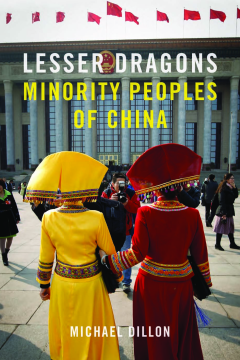
Additional Information
Book Details
Abstract
Lesser Dragons is a timely introduction to the fascinating, complex, and vital world of China’s national minorities. Drawing on firsthand fieldwork in several minority areas, Michael Dillon introduces us to the major non-Han peoples of China, including the Mongols, the Tibetans, the Uyghur of Xinjiang, and the Manchus, and traces the evolution of their relationship with the Han Chinese majority. With chapters devoted to each of the most important minority groups and an additional chapter exploring the parallel but very different world of inter-ethnic relations in Taiwan, Lesser Dragons will interest anyone eager to understand the reality behind regional conflicts increasingly covered by global media. From the tense security situation in Xinjiang to China’s attitude toward Tibet and the Dalai Lama, to the resistance efforts of Mongolian herders losing traditional grasslands, Dillon’s book both examines clichés—such as those found in the Chinese press, which often portrays ethnic minorities as colorful but marginal people—and defies expectations. He shows us how these minority peoples’ religions, cultures, and above all languages mark these groups as distinct from the Chinese majority—distinct, yet endangered by the systemic forces of integration.
Michael Dillon was founding director of the Centre for Contemporary Chinese Studies at Durham University, where he taught courses on modern China, Chinese history, and Chinese language. He has also been a visiting professor at Tsinghua University, is a fellow of the Royal Historical Society and the Royal Asiatic Society, and a member of the Royal Institute of International Affairs.
Table of Contents
| Section Title | Page | Action | Price |
|---|---|---|---|
| Cover | Cover | ||
| Title Page | 3 | ||
| Imprint Page | 4 | ||
| Contents | 5 | ||
| Preface | 7 | ||
| Introduction: Dragons, Majorities and Minorities | 9 | ||
| 1. Evolution of Ethnic Classification and Policies | 28 | ||
| 2. Multicultural Beijing Past and Present: Lama Temple and Chinese Ethnic Culture Park | 45 | ||
| 3. Hakkas: A Han Minority | 59 | ||
| 4. Hui Muslims and their Neighbours in Northwest China | 70 | ||
| 5. Xinjiang and the Uyghurs | 90 | ||
| 6. Mongols of Inner Mongolia | 117 | ||
| 7. Tibet and the Tibetans | 134 | ||
| 8. Minorities of the Southwest: Yunnan Province | 155 | ||
| 9. Manchus: The Renaissance of an Ethnic Group | 167 | ||
| 10. Minor Minorities and Disputed Identities | 177 | ||
| 11. Taiwan: Another China, Another Model | 186 | ||
| 12. Ethnic-minority Policies: Unity and Conflict | 200 | ||
| Conclusion: Ethnic Minorities in the Age of Xi Jinping | 217 | ||
| China’s National Minorities (shaoshu minzu) | 222 | ||
| References | 225 | ||
| Further Reading | 237 | ||
| Acknowledgements | 243 | ||
| Index | 247 |
